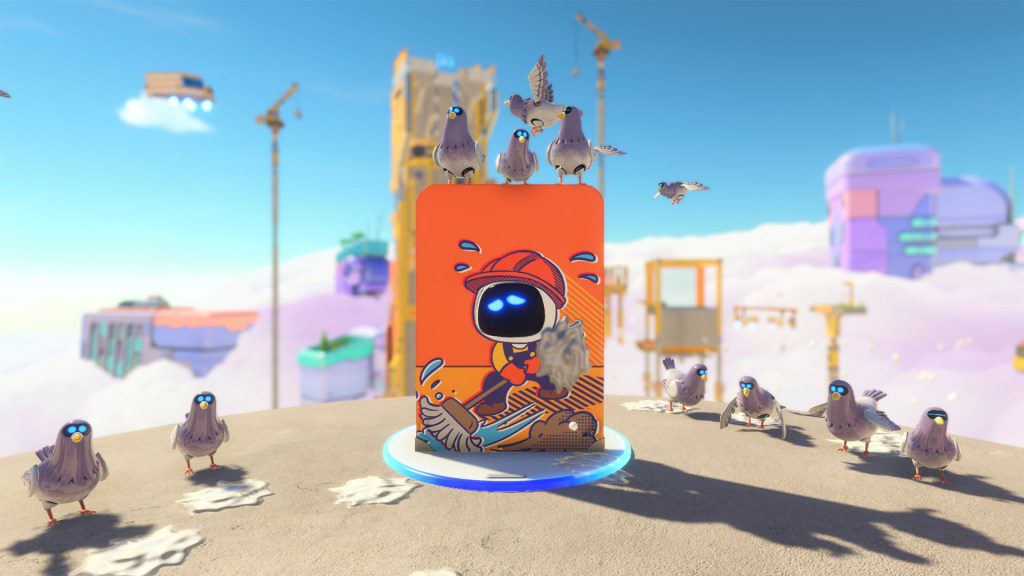PlayStation’s ‘Astro Bot’ Beats Mario at His Own Game
There’s a lot of pressure associated with being the face of a brand. For Nintendo fans, new Super Mario releases are expected to be the crème de la crème of gaming; it’s the flagship franchise that sets the standard to meet for everyone else. For others like PlayStation? Well, that’s trickier.
Since its introduction in 1994, Sony PlayStation has had a revolving door of mascots that have mostly come and gone like a generational flash in the pan. It began with Crash Bandicoot, whose satirical ads mocked Nintendo, but that didn’t last past the Nineties. Then there was Spyro, and Sly Cooper, and Jak & Daxter, and eventually Sackboy. But by the 2010s, Sony had mostly given up playing the kingmaker for kiddie-heroes. It had found success focusing on mature fare like The Last of Us and God of War, cinematic blockbusters that defined the modern era of gaming.
But now, at a point where AAA gaming is beginning to show its seams with big budget misfires chasing too many trends, Sony has looked to its past to potentially reshape its future. Yet its inspiration comes from the unlikeliest of places: a faceless little robot named Astro.
Created by Team Asobi, a studio known for showcases for new Sony tech rather than full-length releases, Astro Bot started out as an avatar for mini-game collections like 2013’s The Playroom VR, and became the playable character for demos that come paired with new PlayStation hardware like the PSVR and PlayStation 5. With a chibi build and affable demeanor, Astro’s less of a character and more of a canvas. He can be anything, no need for explanation. Just pick him up and play.
Astro’s a bot of many faces, and never skips a chance for a funny photo op.
Sony Interactive Entertainment
But beginning with 2020’s Astro’s Playroom, a pack-in title for the launch of the PlayStation 5, that lack of personality became a superpower. As a tech demo for all the console’s kitschy new features, Astro’s Playroom also served as a broader celebration of PlayStation’s history, taking players through levels designed around each of its past systems with Astro as their guide. Met with a stellar reception, the bite-sized platformer was a joy to play and left many wondering when Astro would get his own true game. Now, with Astro Bot (out Sept. 6), it’s his time to shine.
Like Astro’s Playroom, the new game is heavily steeped in PlayStation’s lore — to the point where it’s practically a 10-hour ad for Sony’s IP and hardware. Astro literally lives inside a PS5, hurtling through space with his bot buddies until an alien attacks, leaving them marooned on a desert planet. From there, players must make their way through more than 50 levels on a quest to rebuild their ship with pieces of PS5 tech and find 300 missing bots along the way.
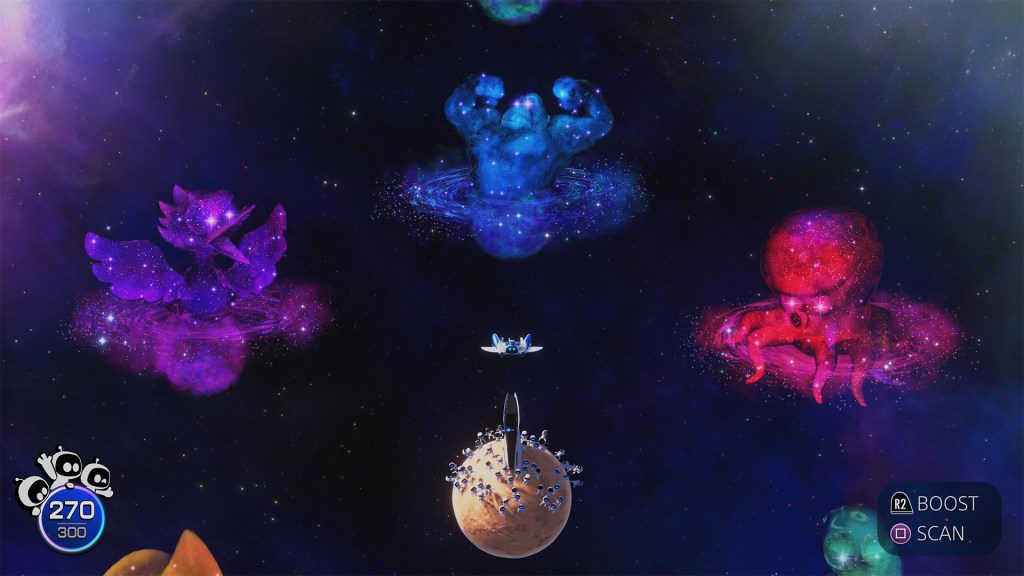
The traditional “overworld” map is a series of galaxies all filled within individual stages.
Sony Interactive Entertainment
Anyone who’s played Super Mario World or Crash Bandicoot knows the drill. There are six worlds to explore, each broken up into smaller levels filled with secrets, puzzle pieces, and missing team members to find. Environments range from all the staples of gaming biomes, from grassy woods to snowy hills, and the eventual lava levels with every trope in between.
To get through each area, players must use Astro’s basic abilities like jump and punch (lots of it, you can literally punch everything), and little laser boosters on the soles of his feet to defeat enemies big and small, as well as make plenty of harrowing leaps.
If this all sounds like business as usual, that’s because it is. But to trivialize the gameplay and design of Astro Bot would be a disservice because it’s fucking great.
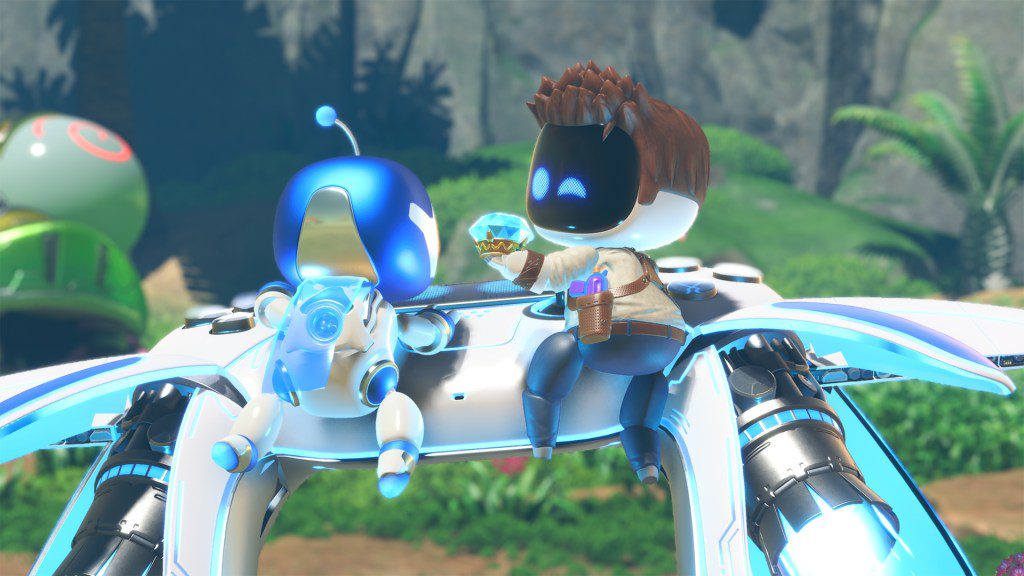
Astro is a blank slate, allowing him to fit right in alongside PlayStation’s greats like Nathan Drake.
Sony Interactive Entertainment
Like in his initial PS5 outing, Astro controls expertly, with little lag or margin of error in his actions. His movements and jumps are precise yet effortlessly readable in their execution. Paired with the haptic feedback of the controller, which vibrates in tandem with each tippy tappy step and hefty blow, Astro’s character model feels tangible and heavy with real-world weight. That tangibility is key and applies to everything that populates this world.
To say you can punch everything is an understatement, it’s the primary form of interaction in the game and serves to give a toylike vibe to even the smallest of details. Everything reacts to touch: trees sway and lose their brush, snow and sand displace to leave only granules behind. It feels like the entirety of the PlayStation 5’s inner horsepower is running at its max to make an interactive Pixar movie come to life.
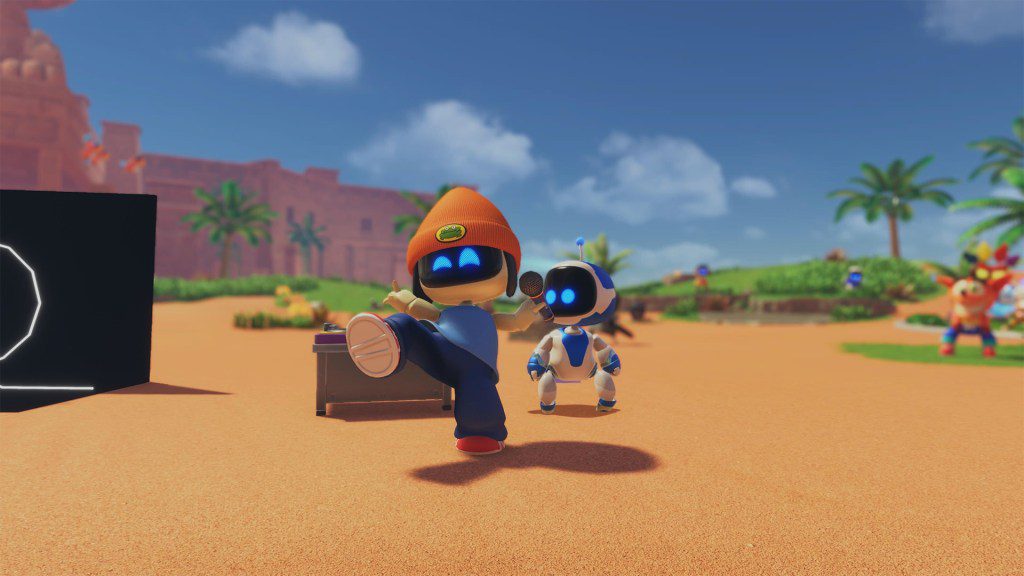
The hub world becomes a living gallery of all things PlayStation.
Sony Interactive Entertainment
Pulling from Nintendo’s school of design, Team Asobi has crafted worlds that are brimming with wonder. Every nook hides a secret and there’s always something happening just outside the periphery. Bots aren’t just waiting dormant to be found, they’re usually dangling from a tree crying for help or besieged by a troupe of monsters nipping at their heels. Many are just basic models, but more than half are designed to copy classic characters from PlayStation’s history, and there’s some deep cuts. Alongside every Nathan Drake or Solid Snake, there’s a protagonist from a franchise whose existence you’ve likely forgotten until falling down a google rabbit hole.
The Pokémon-like appeal of collecting dozens of PlayStation-flavored bots is gratifying, but it’s not all just window dressing. While the bulk of the levels have their own house feel and design, each world has a specific level centered entirely on an iconic Sony franchise that changes the way things play.
Normal levels are usually built around a key ability like a rocket booster pack or a pair of extended-reach boxing gloves, which become the key to advancing in each stage. Much like the power-ups of Mario games, these items are introduced early on in simple introductory levels before quickly gaining complexity in tougher ones. There’s a stopwatch mechanic that might be one of the best uses of time dilation ever seen in gaming, where Astro can slow down time at the push of a button to turn everything from spinning knives to floating leaves into platforms with a Matrix-style take on platforming. The detail in these moments is astounding, with particle effects warping in air, down to the saliva careening from a boss enemy’s mouth stuck in time like rain.
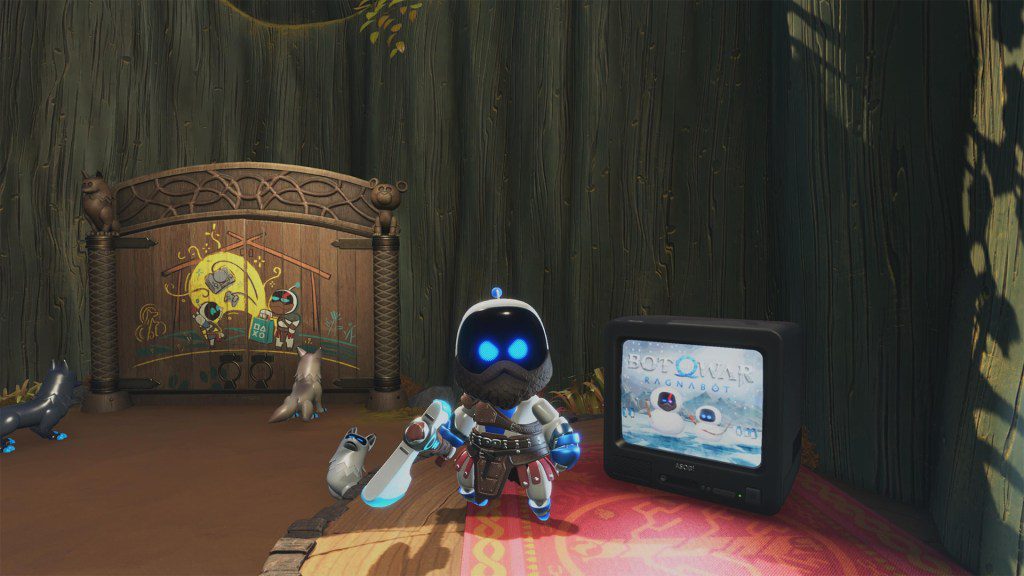
Empowering Astro with other character’s abilities is saved for special climactic levels with a punch.
Sony Interactive Entertainment
The mixing and matching of these special abilities are stellar, but it’s in the special PlayStation-inspired levels that the potential of Astro Bot is clearest. As a blank slate, Astro does a lot with surprisingly little beyond a pair of LED eyes to charm players, but upon taking on the identity of other famous characters, his cutesy robo chic ascends to the next level.
One such mashup occurs early on, with a God of War-themed level that sees Astro meeting bot versions of Kratos and his son Atreus. Gifted the Leviathan Axe, Astro takes on the power of a god and Kratos’ face to match. Now, the game becomes a streamlined, kid-friendly slant on the mechanics of God of War within Astro Bot, as players can throw and recall the axe to defeat Norse-themed enemies and Odin’s green ravens.
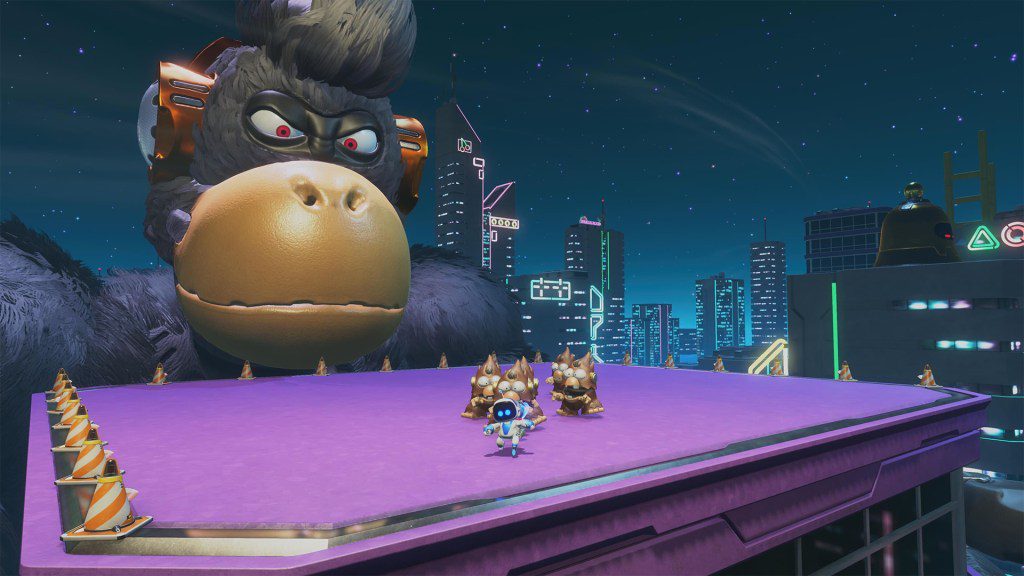
Towering boss battles with insanely high caliber visuals make ‘Astro Bot’ stand apart from the competition.
Sony Interactive Entertainment
The Mega Man-esque ability to adopt other characters’ looks and powers is the secret sauce of Astro Bot that could prove to be fodder for half a dozen sequels, but it’s played more subtly than you’d expect. The developers could have leaned on the ability for the entire game, but instead chose to craft a platformer that looks and plays superbly on its own merits before leaning wholly on established IP. These special levels are more like rewards for conquering each world, serving as the climax for each, and amounting to maybe less than ten percent of the overall experience.
But while the surprising restraint on themed levels is admirable, don’t be fooled. Astro Bot is essentially a playable advertisement for PlayStation. Its levels are packed to the brim with the visual language and iconography of not just the company’s famous first-party franchises, but even references to games owned by other companies like Resident Evil or Tomb Raider, that are only loosely associated with the PlayStation name. In-game items like PS1 memory cards and DualShock controller cables double for platforms and tightropes to walk. Every single level begins with Astro riding a PS5 controller into the field like a stallion.
None of this should work. Yet, it does.
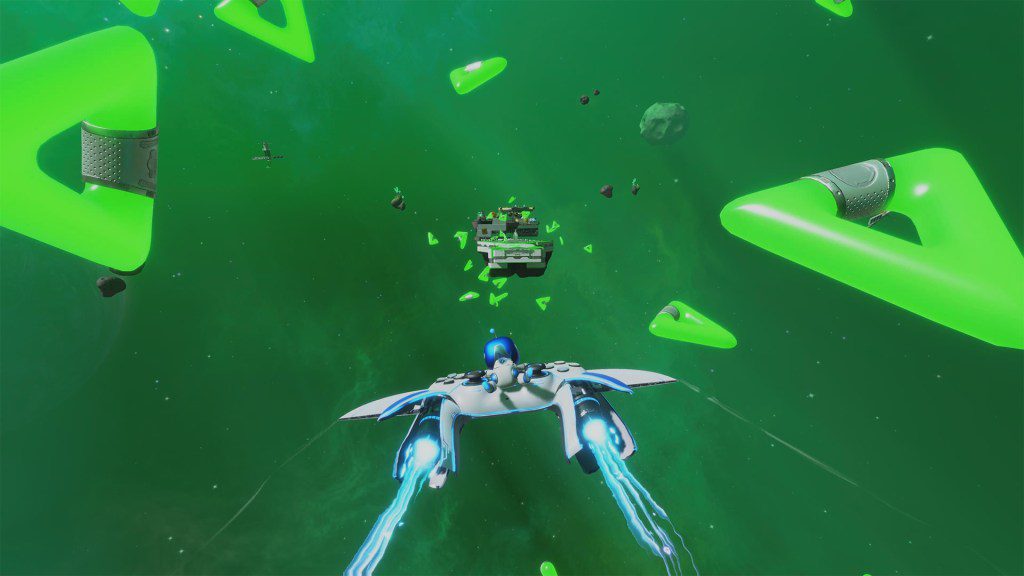
There are literally levels whose themes is just “triangle button” from the PlayStation controller.
Sony Interactive Entertainment
Unlike recent games that have harvested IP recognition and misplaced nostalgia, Astro Bot prevails by refusing to settle for being a wobbly cameo parade. The core gameplay, character and world design, and general vibe of Astro Bot is woven well enough to stand on its own, which makes the love letter elements just a little bit sweeter. If there were a version of Astro that existed entirely devoid of self-referential aspects, it would still be a fantastic game; the one that we’ve got just happens to be damned near perfect.
For anyone who grew up with the joy of games like Crash Bandicoot or Super Mario Galaxy, Astro Bot feels like a warm hug, and a reminder of what gaming used to be before the dominance of military shooters, Soulslikes, and live service. It’s a contained, tightly knit single-player adventure that celebrates the artistry of minutiae. It’s also just really, really fun.
With creative level design and clever implementation of Astro’s abilities, the game is extremely well-polished and plays like the Platonic ideal of what the platforming genre can be. Pushing the PS5’s hardware to its furthest, its visuals and effects are astonishing in ways that puts the competition to shame. By knowing where and when to lean on nostalgia while remaining a consistently exhilarating experience throughout, Astro Bot also manages to overcome the cynicism of corporate franchise mining.
Astro Bot stands shoulder to shoulder with some of the best platformers ever made, but as of now, it’s easily the best one of this generation. Move over Mario, there’s a new player in town.


